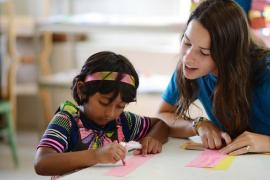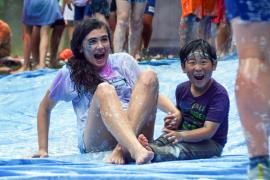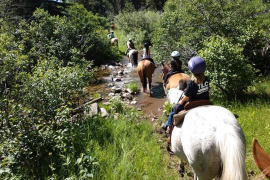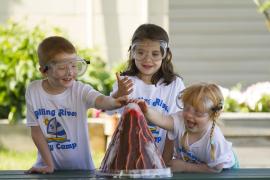Camp Twin Lakes (CTL) serves campers who have medical illnesses, disabilities, and other adverse childhood experiences at three year-round camp locations in Georgia.
CTL operates as a nonprofit partner model camp, serving nearly 80 partner organizations each year. CTL’s partners are also nonprofit organizations who bring the populations they serve to CTL’s facilities for therapeutic, educational, and recreational camping programs.
The conversation around the impact of camp seems to be moving in a very exciting and promising direction. Camp is being recognized as a vital element in the out-of-school-time landscape, capable of preparing kids and teens — especially under-resourced and under-represented youth — for their time at school. In the same way that academic learning loss resulted from the pandemic, there is broad acknowledgement that youth also lost important social and emotional learning opportunities.
This is where camp thrives. This is also where we as a camp community can leverage our outcomes and program quality data to build sustainable funding around our work. CTL is currently in our second year of the American Camp Association’s (ACA) Camp-School Partnership Demonstration Project (CSPD). This program utilizes federal American Rescue Plan (ARP) funds to better prepare low-income students adversely impacted by the pandemic for their upcoming school year through a high-quality summer learning experience. We are also entering our second year in the Building Opportunities Outside of School Time (BOOST) grant, another ARP-funded program seeking to harness, evaluate, share, and leverage the impact of out-of-school-time interventions on students.
These projects make my outcomes- and grants-loving heart skip.
Program outcomes and quality have become common themes in our work. Having these systems in place ensure that we have long-term, positive impacts on the children, teens, and young adults we serve. They also ensure our programs are built on validated elements for youth development. They also secure our funding eligibility in new spaces.
The CSPD and the BOOST grants first asked about distinct and measurable outcomes: How does CTL help children and youth re-engage, connect, and learn outside of the classroom? In answering, we emphasized our outcomes of sense of belonging, wellness, and self-efficacy. We also described the role of camp in providing whole child supports, including physical and emotional safety, daily meals and snacks, and the chance to develop meaningful peer and mentor relationships. For the CSPD, we are specifically serving low-income children from a rural county who are experiencing abuse or neglect. Being able to provide residential programming during the summer gives school counselors and paraprofessionals the chance to lean into these student campers more deeply, leading to greater strides in their therapy goals and greater gains in the classroom.
Then, we had to share how we would evaluate the efficacy of our programs. Here, we emphasized our engagement with ACA to build a program quality assessment. Our assessment tool is based on validated social and emotional learning criteria, including fostering growth mindset, scaffold learning, emotion coaching, and supporting youth plans and goals. This summer, CTL will again observe our activities for signs of high-quality youth programs as defined by the ACA’s Continuous Camp Program Quality Improvement supports. Results of these observations will be used to motivate summer and full-time staff — celebrating what we do well is a great learning tool — and help us identify ways to improve. A late summer in-service training recaps the results for our staff and gives them ideas for closing out the summer with intention.
These pieces — program efficacy and measurable outcomes — are tied together to drive camper impact. Each program element is linked with the camper outcome it’s intended to impact, and each program element is evaluated using our assessment tool. In 2023, we are continuing to test hypotheses to improve camper outcomes using data from our 2021 and 2022 summer surveys and program quality improvement plan. For example: Can we impact campers’ growth mindset (outcome) by increasing the dosage and intentionality of post-activity and end-of-day debriefing sessions (program element)? This will involve adjustments to staff training and program scheduling, ensuring our staff and volunteers know how to create opportunities for discussion and that we have built in time to do so.
Finally, these pieces can directly drive donor engagement. The CSPD and BOOST programs gave us the chance to elevate the camp story outside of our typical community of supporters, positioning camp as an important industry that impacts school-age children outside of the classroom. We are continuing to expand the way we talk about our programs, leading with our outcomes, to build long-term, sustainable donor relationships in new spaces.
Program quality assessment and program outcomes are interrelated. They are becoming more common themes in conversations about the importance of out-of-school-time activities — and in the opportunities to fund them. Having a plan for gathering and using data is central to Camp Twin Lakes’ programming, operations, and fundraising plans. We are excited to continue working with the ACA and other organizations in our state and nation to increase visibility and funding for the incredible impact of camp!
Anna Hutchins is the director of grants and outcomes measurement at Camp Twin Lakes.
If you’re interested in learning more about how to continuously improve the quality of your programs with the support of ACA, contact Jessie Dickerson at [email protected]. Bristol Posatko, [email protected], can answer your Camp-School Partnership Demonstration Project Questions. If you want to talk more about data and fundraising, Anna would love to chat. You can reach her at [email protected].
The views and opinions expressed by contributors are their own and do not necessarily reflect the views of the American Camp Association or ACA employees.




